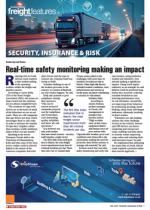Theft, hijackings and fraud remain persistent threats in the logistics and transport industry. But as Siva Pather, managing director of Land and Sea Risk, pointed out, the real challenge extended far beyond the criminal incidents.“It’s not just about the incidents – it’s also about how long it takes to recover and the losses that come with downtime,” he told Freight News. “One of the key issues is that many companies don’t have the right type of insurance or enough support when things go wrong.”In a sector where time is money and reputation everything, the lack of adequate cover can cripple operations. Pather emphasised the importance of policies that were not only tailored to the realities on the ground, but also provided tangible support when it was needed most. “Our goal is to offer policies that are clear, fair and useful in a crisis,” he said.Land and Sea Risk is a new player in the insurance space, but one with a clear mission: to help clients reduce costs without compromising protection. “We’re a new company that has seen the real potential in helping customers save money on their insurance,” said Pather. “Many businesses, especially those with vehicles, machinery or large assets, are overpaying without realising it.”Simple, effective solutionsThe company focuses on delivering simple, effective insurance solutions that still provide robust cover, particularly for f leets, equipment and buildings. “We’ve also partnered with major underwriters, which gives our customers peace of mind,” he said.While Land and Sea Risk does not yet operate through digital systems, its strength lies in a hands-on, consultative approach. “We’re making a difference by listening to our clients and structuring policies that make sense for their business,” said Pather. This client-first philosophy helps the business carve out a niche in a traditionally rigid sector, where f lexibility and relevance are becoming increasingly important.According to Pather, the industry is shifting toward more personalised, practical insurance solutions. “We believe more companies will look for insurance partners who understand their industry and are willing to be f lexible,” he said. “There’s pressure on budgets, so cost-saving will be key, but not at the expense of good cover.”He said the future of freight insurance included more emphasis on prevention. “More attention will go to risk prevention, not just cover after the fact. If we can help our clients avoid problems upfront, everyone wins.”Keeping costs downHe noted that while they were new to the market, their approach was rooted in real-world understanding. “We are not trying to be the biggest player – we just want to be the most helpful. If you have vehicles, machines or assets you rely on daily, we’d love to see where we can help you protect them while keeping costs down.”According to Pather, many in the industry feel that insurance is too expensive or complicated. “They’re often paying for things they don’t need or are not covered for the things they do need. Claims can also take too long. As insurers, we need to get better at listening, keeping things clear, and giving proper service. That’s where we try to stand out – by being practical, helpful and focused on saving clients money without cutting corners.”He said there had been a definite increase in equipment theft, higher accident rates, and delays caused by poor infrastructure or border issues. “Some of this is due to tough economic times, more pressure on the roads and companies being stretched thin. We think it’s important for insurers and logistics companies to work closely, so risks are better understood and planned for.”More tailoredAsked about trends, he said insurance was becoming more tailored. “Instead of one big policy covering everything, companies are opting to choose specific insurance for different parts of their operation, like trucks, equipment, warehouses or goods in transit. This makes it easier to manage costs and only pay for what you really need,” he said.“Globally, more companies are using tracking devices, cameras and software to monitor their cargo and vehicles. These tools help prevent losses and speed up claims. While it’s not yet common across all of Africa, we think more local companies will start investing in these tools over time. We’re watching the space closely and will bring in digital solutions when the time is right.” LV

